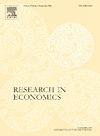The bias of consumption-interdependent markets
IF 1.3
Q3 ECONOMICS
引用次数: 0
Abstract
Depending on consumption complementarity, the partial equilibrium effect of taxes and subsidies in the price of a commodity underestimates or overestimates the general equilibrium effect. We formalize this theoretical issue relating it to a practical problem: if we use a tax-free market as a counterfactual to see the price consequences of taxing another market, our estimates will be biased because the Stable Unit Treatment Value Assumption (SUTVA) is violated. In this manuscript, we present a general formula for the relative size of this bias, which we will call “the bias of consumption-interdependent markets”. Our results lead to methodological warnings and recommendations about how tax-free markets can be used as controls to study the treatment effect of a tax on the price of a particular market: the treated market and the control should have a low degree of substitution/complementarity; but, even so, the relative size of the bias we study depends not only on the degree of substitution/complementarity between treated and control, but also on the degree of substitution/complementarity of treated and control with any other commodity.
消费依赖市场的偏见
根据消费互补性,税收和补贴对商品价格的部分均衡效应低估或高估了一般均衡效应。我们将这一理论问题与一个实际问题形式化:如果我们使用免税市场作为反事实来观察对另一个市场征税的价格后果,我们的估计将会有偏差,因为稳定单位处理价值假设(SUTVA)被违反了。在本文中,我们提出了这种偏差相对大小的一般公式,我们将其称为“消费相互依赖市场的偏差”。我们的研究结果在方法上提出了警告和建议,即如何将免税市场用作研究税收对特定市场价格的处理效果的控制:被处理的市场和控制应该具有低程度的替代/互补性;但是,即便如此,我们研究的偏差的相对大小不仅取决于处理和控制之间的替代/互补程度,还取决于处理和控制与任何其他商品的替代/互补程度。
本文章由计算机程序翻译,如有差异,请以英文原文为准。
求助全文
约1分钟内获得全文
求助全文
来源期刊

Research in Economics
ECONOMICS-
CiteScore
1.40
自引率
0.00%
发文量
37
审稿时长
89 days
期刊介绍:
Established in 1947, Research in Economics is one of the oldest general-interest economics journals in the world and the main one among those based in Italy. The purpose of the journal is to select original theoretical and empirical articles that will have high impact on the debate in the social sciences; since 1947, it has published important research contributions on a wide range of topics. A summary of our editorial policy is this: the editors make a preliminary assessment of whether the results of a paper, if correct, are worth publishing. If so one of the associate editors reviews the paper: from the reviewer we expect to learn if the paper is understandable and coherent and - within reasonable bounds - the results are correct. We believe that long lags in publication and multiple demands for revision simply slow scientific progress. Our goal is to provide you a definitive answer within one month of submission. We give the editors one week to judge the overall contribution and if acceptable send your paper to an associate editor. We expect the associate editor to provide a more detailed evaluation within three weeks so that the editors can make a final decision before the month expires. In the (rare) case of a revision we allow four months and in the case of conditional acceptance we allow two months to submit the final version. In both cases we expect a cover letter explaining how you met the requirements. For conditional acceptance the editors will verify that the requirements were met. In the case of revision the original associate editor will do so. If the revision cannot be at least conditionally accepted it is rejected: there is no second revision.
 求助内容:
求助内容: 应助结果提醒方式:
应助结果提醒方式:


